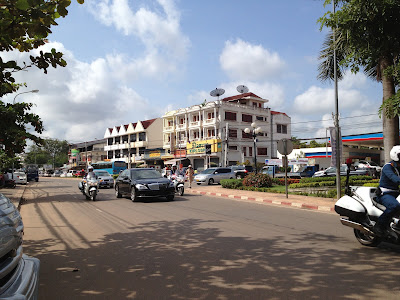The ASEAN summit in Phnom Penh had two important tasks: Human rights and the situation in the South China Sea. Cambodia as the host failed two times: The human rights declaration is far from what is needed and isn't helping activists at all. It basically writes down the status quo for most countries in ASEAN, where torture, unjustice and a weak legal system is still the standard. No wonder that Cambodia, having a long rap sheet in human rights, wasn't pushing for more.
More important for the strategic role of South-East Asia is of course the South China Sea with it's natural ressources. China basically claims the whole area as it's own territory, while the Philippines and Vietnam disagree. But China has it's own way of diplomacy: It won't talk to all, instead it insists in bilateral talks. It tries to outplay the ASEAN countries, and the the way it does it is with pressure and money. That works very well for Cambodia, the ASEAN chair, whose dictator Hun Sen is after the death of former King Sihanouk even closer with his friends in Bejing.
So the Cambodia government failed also with this issue. Instead of bringing the ASEAN countries closer together and unite them, it's role was to support the separation managed by China.
But something else happend: Although President Barack Obama came to the summit for the second time, he made a stop in Myanmar before for the first time. Actually he was the first US-President ever to visit the country. Why he came? To set a statement, mainly to China. It says "We are here and we take the competition".
The US knows that the importance of the middle-east is fading. Recent research showed that the US can be independet from Arab oil in a decade. The Palestin-Israel conflict is annoying and doesn't come to any solution. The new markets and big players are in Asia. That's why Obama is looking for allies, trying to strenght assisting ties and reviving old relations.
He can count on the Philippines, a long standing partner. Malaysia, Indonesia and Brunei are muslim countries, but moderate, and they don't like China at all. For them, it is Asia first, but second maybe America more than China. Vietnam had already issues with China, and the South China Sea conflict doesn't make it better. They agreed recently to accept military support from the US.
Thailand is trying to be polite and neutral. At least this is what the government does. Laos is already becoming a Chinese puppet, and so is Cambodia. But both are the poorest and least important countries.
Beside the governments, there are the people. Obama mentioned in his speech in Yangon that the most important and difficult job is not being president, but a citizen. Al his remarks about freedom and dignity and respect was targeting the common people.
What America always did very successfully was selling a life style. And it works pretty good. You won't see people standing on the street with signs "I love Hu Jintao" or "We love Wen Jiabao" (unless they are forced to). You won't see local activists demanding the Chinese premier to help them in environmental or human rights issues. But they do it when Obama comes. And they do it because he sells hope and the American way of life. This is what the people want.
Of course, reality in term of human rights isn't anymore what it was in the US. They just renamed "polical prisoners" to "terrorists" and all of a sudden everything is fine. They did not limit the freedom of speeach but instead installed the Patriot Act. The US is becoming more and more repressive, basically for the same reason regimes always become: The ruling relite doesn't want to share it's privilegies with too many others.
But still people trust America more than China. And Myanmar plays an important role. It's government is begging the west for more engagement, because they know if China wins, the old guys will come back and all the efforts for opening and more freedom will be set back.
The common people already made a decision: Their own country first, ASEAN next. But when it comes to a lifestyle, then it is the western way of living. Not just in terms of consumer goods (and safety of products), but also in freedom of speech and human rights.
Again Asia will the stage for the competiton of ideas. Let's just hope this time it will remain a competition and not becoming a fight again.

























